Partnership
-
 KAIST and Google Partner to Develop AI Curriculum
Two KAIST professors, Hyun Wook Ka from the School of Transdisciplinary Studies and Young Jae Jang from the Department of Industrial and Systems Engineering, were recipients of Google Education Grants that will support the development of new AI courses integrating the latest industrial technology. This collaboration is part of the KAIST-Google Partnership, which was established in July 2019 with the goal of nurturing AI talent at KAIST.
The two proposals -- Professor Ka’s ‘Cloud AI-Empowered Multimodal Data Analysis for Human Affect Detection and Recognition’ and Professor Jang’s ‘Learning Smart Factory with AI’-- were selected by the KAIST Graduate School of AI through a school-wide competition held in July. The proposals then went through a final review by Google and were accepted. The two professors will receive $7,500 each for developing AI courses using Google technology for one year.
Professor Ka’s curriculum aims to provide a rich learning experience for students by providing basic knowledge on data science and AI and helping them obtain better problem solving and application skills using practical and interdisciplinary data science and AI technology.
Professor Jang’s curriculum is designed to solve real-world manufacturing problems using AI and it will be field-oriented. Professor Jang has been managing three industry-academic collaboration centers in manufacturing and smart factories within KAIST and plans to develop his courses to go beyond theory and be centered on case studies for solving real-world manufacturing problems using AI.
Professor Jang said, “Data is at the core of smart factories and AI education, but there is often not enough of it for the education to be effective. The KAIST Advanced Manufacturing Laboratory has a testbed for directly acquiring data generated from real semiconductor automation equipment, analyzing it, and applying algorithms, which enables truly effective smart factory and AI education.”
KAIST signed a partnership with Google in July 2019 to foster global AI talent and is operating various programs to train AI experts and support excellent AI research for two years.
The Google AI Focused Research Award supports world-class faculty performing cutting-edge research and was previously awarded to professors Sung Ju Hwang from the Graduate School of AI and Steven Whang from the School of Electrical Engineering along with Google Cloud Platform (GCP) credits. These two professors have been collaborating with Google teams since October 2018 and recently extended their projects to continue through 2021.
In addition, a Google Ph.D. Fellowship was awarded to Taesik Gong from the School of Computing in October this year, and three Student Travel Grants were awarded to Sejun Park from the School of Electrical Engineering, Chulhyung Lee from the Department of Mathematical Sciences, and Sangyun Lee from the School of Computing earlier in March. Five students were also recommended for the Google Internship program in March.
(END)
2020.12.11 View 14908
KAIST and Google Partner to Develop AI Curriculum
Two KAIST professors, Hyun Wook Ka from the School of Transdisciplinary Studies and Young Jae Jang from the Department of Industrial and Systems Engineering, were recipients of Google Education Grants that will support the development of new AI courses integrating the latest industrial technology. This collaboration is part of the KAIST-Google Partnership, which was established in July 2019 with the goal of nurturing AI talent at KAIST.
The two proposals -- Professor Ka’s ‘Cloud AI-Empowered Multimodal Data Analysis for Human Affect Detection and Recognition’ and Professor Jang’s ‘Learning Smart Factory with AI’-- were selected by the KAIST Graduate School of AI through a school-wide competition held in July. The proposals then went through a final review by Google and were accepted. The two professors will receive $7,500 each for developing AI courses using Google technology for one year.
Professor Ka’s curriculum aims to provide a rich learning experience for students by providing basic knowledge on data science and AI and helping them obtain better problem solving and application skills using practical and interdisciplinary data science and AI technology.
Professor Jang’s curriculum is designed to solve real-world manufacturing problems using AI and it will be field-oriented. Professor Jang has been managing three industry-academic collaboration centers in manufacturing and smart factories within KAIST and plans to develop his courses to go beyond theory and be centered on case studies for solving real-world manufacturing problems using AI.
Professor Jang said, “Data is at the core of smart factories and AI education, but there is often not enough of it for the education to be effective. The KAIST Advanced Manufacturing Laboratory has a testbed for directly acquiring data generated from real semiconductor automation equipment, analyzing it, and applying algorithms, which enables truly effective smart factory and AI education.”
KAIST signed a partnership with Google in July 2019 to foster global AI talent and is operating various programs to train AI experts and support excellent AI research for two years.
The Google AI Focused Research Award supports world-class faculty performing cutting-edge research and was previously awarded to professors Sung Ju Hwang from the Graduate School of AI and Steven Whang from the School of Electrical Engineering along with Google Cloud Platform (GCP) credits. These two professors have been collaborating with Google teams since October 2018 and recently extended their projects to continue through 2021.
In addition, a Google Ph.D. Fellowship was awarded to Taesik Gong from the School of Computing in October this year, and three Student Travel Grants were awarded to Sejun Park from the School of Electrical Engineering, Chulhyung Lee from the Department of Mathematical Sciences, and Sangyun Lee from the School of Computing earlier in March. Five students were also recommended for the Google Internship program in March.
(END)
2020.12.11 View 14908 -
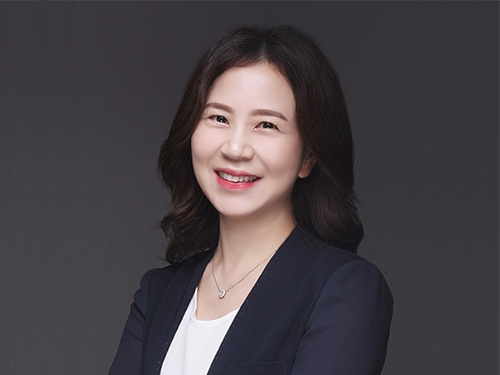 Professor Alice Haeyun Oh to Join GPAI Expert Group
Professor Alice Haeyun Oh will participate in the Global Partnership on Artificial Intelligence (GPAI), an international and multi-stakeholder initiative hosted by the OECD to guide the responsible development and use of AI. In collaboration with partners and international organizations, GPAI will bring together leading experts from industry, civil society, government, and academia.
The Korean Ministry of Science and ICT (MSIT) officially announced that South Korea will take part in GPAI as one of the 15 founding members that include Canada, France, Japan, and the United States.
Professor Oh has been appointed as a new member of the Responsible AI Committee, one of the four committees that GPAI established along with the Data Governance Committee, Future of Work Committee, and Innovation and Commercialization Committee.
(END)
2020.06.22 View 9814
Professor Alice Haeyun Oh to Join GPAI Expert Group
Professor Alice Haeyun Oh will participate in the Global Partnership on Artificial Intelligence (GPAI), an international and multi-stakeholder initiative hosted by the OECD to guide the responsible development and use of AI. In collaboration with partners and international organizations, GPAI will bring together leading experts from industry, civil society, government, and academia.
The Korean Ministry of Science and ICT (MSIT) officially announced that South Korea will take part in GPAI as one of the 15 founding members that include Canada, France, Japan, and the United States.
Professor Oh has been appointed as a new member of the Responsible AI Committee, one of the four committees that GPAI established along with the Data Governance Committee, Future of Work Committee, and Innovation and Commercialization Committee.
(END)
2020.06.22 View 9814 -
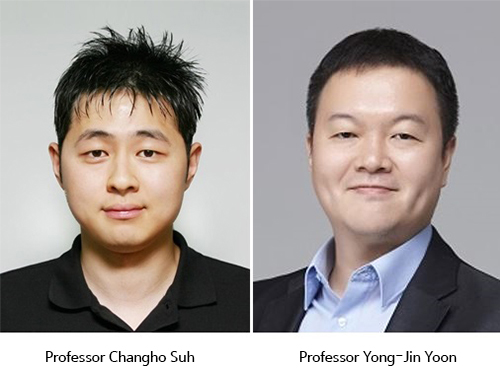 KAIST and Google Jointly Develop AI Curricula
KAIST selected the two professors who will develop AI curriculum under the auspices of the KAIST-Google Partnership for AI Education and Research. The Graduate School of AI announced the two authors among the 20 applicants who will develop the curriculum next year. They will be provided 7,500 USD per subject.
Professor Changho Suh from the School of Electrical Engineering and Professor Yong-Jin Yoon from the Department of Mechanical Engineering will use Google technology such as TensorFlow, Google Cloud, and Android to create the curriculum.
Professor Suh’s “TensorFlow for Information Theory and Convex Optimization “will be used for curriculum in the graduate courses and Professor Yoon’s “AI Convergence Project Based Learning (PBL)” will be used for online courses. Professor Yoon’s course will explore and define problems by utilizing AI and experiencing the process of developing products that use AI through design thinking, which involves product design, production, and verification. Professor Suh’s course will discus“information theory and convergence,” which uses basic sciences and engineering as well as AI, machine learning, and deep learning.
2019.12.04 View 17392
KAIST and Google Jointly Develop AI Curricula
KAIST selected the two professors who will develop AI curriculum under the auspices of the KAIST-Google Partnership for AI Education and Research. The Graduate School of AI announced the two authors among the 20 applicants who will develop the curriculum next year. They will be provided 7,500 USD per subject.
Professor Changho Suh from the School of Electrical Engineering and Professor Yong-Jin Yoon from the Department of Mechanical Engineering will use Google technology such as TensorFlow, Google Cloud, and Android to create the curriculum.
Professor Suh’s “TensorFlow for Information Theory and Convex Optimization “will be used for curriculum in the graduate courses and Professor Yoon’s “AI Convergence Project Based Learning (PBL)” will be used for online courses. Professor Yoon’s course will explore and define problems by utilizing AI and experiencing the process of developing products that use AI through design thinking, which involves product design, production, and verification. Professor Suh’s course will discus“information theory and convergence,” which uses basic sciences and engineering as well as AI, machine learning, and deep learning.
2019.12.04 View 17392 -
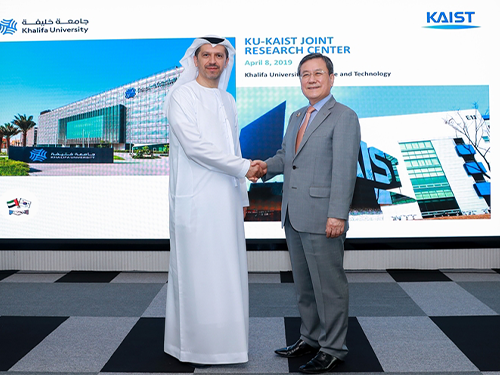 KAIST-KU Joint Research Center for Smart Healthcare & Transportation
(President Shin shakes hands with KU acting Presidedent Arif Al Hammdi at the KAIST-KU Joint Research Center opening ceremony on April 8.)
KAIST opened the KAIST-Khalifa University Joint Research Center with Khalifa University on April 8. The opening ceremony was held at Khalifa University and was attended by President Sung-Chul Shin and Khalifa University Acting President Arif Al Hammadi.
The new research center reflects the evolution of the long-established partnership between the two institutions. The two universities have already made very close collaborations in research and education in the fields of nuclear and quantum engineering.
The launch of this center expanded their fields of collaboration to smart healthcare and smart transportation, key emerging sectors in the Fourth Industrial Revolution. President Shin signed an MOU with the UAE Minister of State for Advanced Science Sarah Amiri and Khalifa University to expand mutual collaboration in technology development and fostering human capital last year.
The center will conduct research and education on autonomous vehicles, infrastructure for autonomous vehicle operation, wireless charging for electric vehicles, and infrastructure for electric autonomous vehicles. As for smart healthcare, the center will focus on healthcare robotics as well as sensors and wearable devices for personal healthcare services.
President Shin, who accompanied a research team from the Graduate School of Green Transportation, said, “We are very delighted to enter into this expanded collaboration with KU. This partnership justifies our long-standing collaboration in the areas of emerging technologies in the Fourth Industrial Revolution while fostering human capital.”
KU Acting President Arif Al Hammadi added, “The outcome of these research projects will establish the status of both institutions as champions of the Fourth Industrial Revolution, bringing benefits to our communities. We believe the new research center will further consolidate our status as a globally active, research-intensive academic institution, developing international collaborations that benefit the community in general.”
2019.04.09 View 9887
KAIST-KU Joint Research Center for Smart Healthcare & Transportation
(President Shin shakes hands with KU acting Presidedent Arif Al Hammdi at the KAIST-KU Joint Research Center opening ceremony on April 8.)
KAIST opened the KAIST-Khalifa University Joint Research Center with Khalifa University on April 8. The opening ceremony was held at Khalifa University and was attended by President Sung-Chul Shin and Khalifa University Acting President Arif Al Hammadi.
The new research center reflects the evolution of the long-established partnership between the two institutions. The two universities have already made very close collaborations in research and education in the fields of nuclear and quantum engineering.
The launch of this center expanded their fields of collaboration to smart healthcare and smart transportation, key emerging sectors in the Fourth Industrial Revolution. President Shin signed an MOU with the UAE Minister of State for Advanced Science Sarah Amiri and Khalifa University to expand mutual collaboration in technology development and fostering human capital last year.
The center will conduct research and education on autonomous vehicles, infrastructure for autonomous vehicle operation, wireless charging for electric vehicles, and infrastructure for electric autonomous vehicles. As for smart healthcare, the center will focus on healthcare robotics as well as sensors and wearable devices for personal healthcare services.
President Shin, who accompanied a research team from the Graduate School of Green Transportation, said, “We are very delighted to enter into this expanded collaboration with KU. This partnership justifies our long-standing collaboration in the areas of emerging technologies in the Fourth Industrial Revolution while fostering human capital.”
KU Acting President Arif Al Hammadi added, “The outcome of these research projects will establish the status of both institutions as champions of the Fourth Industrial Revolution, bringing benefits to our communities. We believe the new research center will further consolidate our status as a globally active, research-intensive academic institution, developing international collaborations that benefit the community in general.”
2019.04.09 View 9887 -
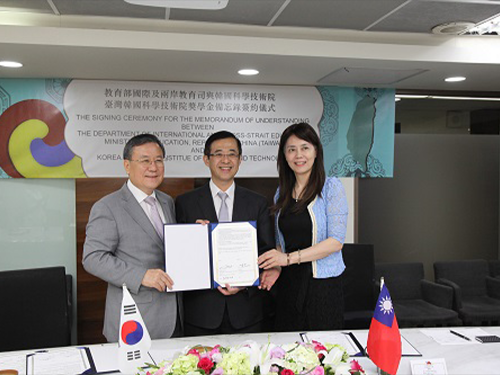 KAIST Partners with Taiwan for PhD Scholarship Program
(President Shin, Taiwanese Acting Minister of Education Yao, Deputy Director General Chang at the Ministry of Education pose after signing the MOU.(from left))
President Sung-Chul Shin signed an MOU with the Ministry of Education in Taiwan for the Taiwanese PhD scholarship program. The signing was made between President Shin and Dr. Yao Leehter, acting Minister of Education in Taiwan, on June 27.
The Taiwanese Ministry of Education is signing MOUs with prestigious universities around the world to encourage its students to pursue study abroad opportunities at top schools. According to the MOU, Taiwanese PhD candidates will be able to use KAIST scholarships for their tuition fees, while the Taiwanese government will provide a stipend and living costs for four years from next September.
KAIST became the 14th university to sign this MOU, joining a group of top universities that includes University of Cambridge, Oxford University, California Institute of Technology, and Columbia University in the US. KAIST is the first institution in Asia to sign the MOU.
Acting Minister Yao said, “KAIST has emerged as a world leading university in less than five decades since its foundation. This remarkable growth led us to partner with KAIST. We hope this will serve as an opportunity to further our partnership in research collaboration as well as students exchanges.”
President Shin appreciated the Taiwanese government’s recognition of KAIST’s global reputation. He said, “We will closely collaborate with the Taiwan government and its universities for transforming educational opportunities to better respond to the Fourth Industrial Revolution.
2018.06.27 View 6754
KAIST Partners with Taiwan for PhD Scholarship Program
(President Shin, Taiwanese Acting Minister of Education Yao, Deputy Director General Chang at the Ministry of Education pose after signing the MOU.(from left))
President Sung-Chul Shin signed an MOU with the Ministry of Education in Taiwan for the Taiwanese PhD scholarship program. The signing was made between President Shin and Dr. Yao Leehter, acting Minister of Education in Taiwan, on June 27.
The Taiwanese Ministry of Education is signing MOUs with prestigious universities around the world to encourage its students to pursue study abroad opportunities at top schools. According to the MOU, Taiwanese PhD candidates will be able to use KAIST scholarships for their tuition fees, while the Taiwanese government will provide a stipend and living costs for four years from next September.
KAIST became the 14th university to sign this MOU, joining a group of top universities that includes University of Cambridge, Oxford University, California Institute of Technology, and Columbia University in the US. KAIST is the first institution in Asia to sign the MOU.
Acting Minister Yao said, “KAIST has emerged as a world leading university in less than five decades since its foundation. This remarkable growth led us to partner with KAIST. We hope this will serve as an opportunity to further our partnership in research collaboration as well as students exchanges.”
President Shin appreciated the Taiwanese government’s recognition of KAIST’s global reputation. He said, “We will closely collaborate with the Taiwan government and its universities for transforming educational opportunities to better respond to the Fourth Industrial Revolution.
2018.06.27 View 6754 -
 WEF-KAIST to Host a Forum Next April in Korea
(President Shin poses with Chairman Schwab at the meeting in Dubai)
President Sung-Chul Shin and Executive Chairman Klaus Schwab of the World Economic Forum agreed to co-host the Fourth Industrial Revolution Forum next April in Seoul during a meeting at the WEF Global Future Councils 2017 held in Dubai November 11-12.
Next April’s forum will be a follow-up event of the roundtable discussion KAIST and the WEF Center for the Fourth Industrial Revolution co-hosted in October in Seoul. The two hosted the roundtable discussion titled “Mastering the Fourth Industrial Revolution: The Future of Jobs and Inclusive Growth in Korea.”
During the annual meeting in Dubai, Chairman Schwab expressed his deep appreciation to President Shin for hosting the roundtable discussion and proposed a full-fledged forum in partnership with KAIST once again, which Chairman Schwab will be scheduled to attend.
Chairman Schwab emphasized once again that Korea, who has the world’s top high-end technologies such as 5G telecommunications and semiconductor memory, will be the best fit to realize the Fourth Industrial Revolution most rapidly. He also expressed his great interest in the city of Daejeon in which is being considered to become the Special City for the Fourth Industrial Revolution.
The Global Future Council of the WEF is the interdisciplinary knowledge network dedicated to promoting innovative thinking on the future. The annual council convenes in Dubai the most relevant and knowledgeable thought leaders from academia, government, business, and civil society to challenge conventional thinking and develop new insights and perspectives on key global systems, as well as the impact and governance of key emerging technologies. This year, more than 850 world-leading experts from 74 countries participated.
Under the theme of ‘Vision 2030,’ participants explored systematic changes in key areas such as energy, mobility, and infrastructure while reflecting on the impact of technological breakthroughs in artificial intelligence, biotechnology, and other areas related to the Fourth Industrial Revolution.
2017.11.13 View 11078
WEF-KAIST to Host a Forum Next April in Korea
(President Shin poses with Chairman Schwab at the meeting in Dubai)
President Sung-Chul Shin and Executive Chairman Klaus Schwab of the World Economic Forum agreed to co-host the Fourth Industrial Revolution Forum next April in Seoul during a meeting at the WEF Global Future Councils 2017 held in Dubai November 11-12.
Next April’s forum will be a follow-up event of the roundtable discussion KAIST and the WEF Center for the Fourth Industrial Revolution co-hosted in October in Seoul. The two hosted the roundtable discussion titled “Mastering the Fourth Industrial Revolution: The Future of Jobs and Inclusive Growth in Korea.”
During the annual meeting in Dubai, Chairman Schwab expressed his deep appreciation to President Shin for hosting the roundtable discussion and proposed a full-fledged forum in partnership with KAIST once again, which Chairman Schwab will be scheduled to attend.
Chairman Schwab emphasized once again that Korea, who has the world’s top high-end technologies such as 5G telecommunications and semiconductor memory, will be the best fit to realize the Fourth Industrial Revolution most rapidly. He also expressed his great interest in the city of Daejeon in which is being considered to become the Special City for the Fourth Industrial Revolution.
The Global Future Council of the WEF is the interdisciplinary knowledge network dedicated to promoting innovative thinking on the future. The annual council convenes in Dubai the most relevant and knowledgeable thought leaders from academia, government, business, and civil society to challenge conventional thinking and develop new insights and perspectives on key global systems, as well as the impact and governance of key emerging technologies. This year, more than 850 world-leading experts from 74 countries participated.
Under the theme of ‘Vision 2030,’ participants explored systematic changes in key areas such as energy, mobility, and infrastructure while reflecting on the impact of technological breakthroughs in artificial intelligence, biotechnology, and other areas related to the Fourth Industrial Revolution.
2017.11.13 View 11078 -
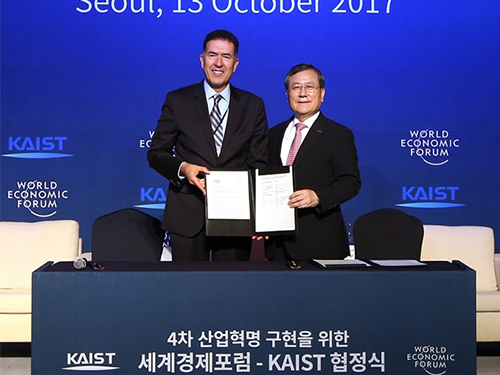 KAIST Partners with WEF to Prepare for the 4th Industrial Revolution
KAIST President Sung-Chul Shin and the Head of the World Economic Forum Center for the Fourth Industrial Revolution, Murat Sonmez, made a commitment to build cooperation in an active manner for addressing the ramifications of the Fourth Industrial Revolution.
The two signed an MOU to cooperate in research in related fields on October 13 after holding a roundtable discussion titled “The Future of Jobs and Inclusive Growth in Korea”. It is the first partnership that the WEF has sealed with an academic institution.The roundtable discussion brought together distinguished guests from politics, non-profit civic organizations, academia, and enterprises including Daejeon Mayor Seon-Taek Kwon, Doosan Group Vice Chairman Lee Hyun-Soon, and Korean Venture Business Association President Ahn Keon-Joon.
During the news conference, President Shin said, “This event means a lot because it explores ways in which inclusive growth and job creation can be realized in Korea. To move forward in the new age of the Fourth Industrial Revolution, every country needs to adopt appropriate new policies suitable for their specific market environments. KAIST will contribute to this process for Korea as well as for the global community.”
President Shin also said, “Korea has been a fast follower in previous industrial revolutions. Now, we have the momentum to seize the opportunities in the wake of this revolution. KAIST is dedicated to leading Korea into becoming a first mover in the Fourth Industrial Revolution by cooperating with the WEF.”
“Two decades later, we will live with considerable number of robots around us. It is possible that our societies in the future will consist of Homo sapiens and Robo sapiens. We need to create new jobs for Homo sapiens to prepare for a society that we will have to coexist with a new industrial tribe. Industries need continuing education to retrain workers for the ever evolving industrial landscape of the future,” President Shin emphasized.
Meanwhile, Sonmez pointed out that all stakeholders should participate in understanding the new industrial environment’s ramifications, saying “Societies, governments, public and private sectors, startups, and academia should co-design inclusive models through global efforts. Ethics and influences on the job market should also be taken into consideration.”
Sonmez said nine factors such as blockchains, internet of things, artificial intelligence, machine learning, cross-border data blow, drones, 3D printing, autonomous driving, the environment, and precision medicine will take center stage in the Fourth Industrial Revolution, In particular, he said that blockchains, which are a cybersecurity technology for online financial transactions, will bring even bigger changes than the ‘World Wide Web’ has done over the past three decades.
“To this end, we will have to work closely with major academic institutes. Through this partnership with KAIST, we will make the fruits of the new industrial environment benefit Koreans and Korean society,” Sonmez added.
2017.10.14 View 10456
KAIST Partners with WEF to Prepare for the 4th Industrial Revolution
KAIST President Sung-Chul Shin and the Head of the World Economic Forum Center for the Fourth Industrial Revolution, Murat Sonmez, made a commitment to build cooperation in an active manner for addressing the ramifications of the Fourth Industrial Revolution.
The two signed an MOU to cooperate in research in related fields on October 13 after holding a roundtable discussion titled “The Future of Jobs and Inclusive Growth in Korea”. It is the first partnership that the WEF has sealed with an academic institution.The roundtable discussion brought together distinguished guests from politics, non-profit civic organizations, academia, and enterprises including Daejeon Mayor Seon-Taek Kwon, Doosan Group Vice Chairman Lee Hyun-Soon, and Korean Venture Business Association President Ahn Keon-Joon.
During the news conference, President Shin said, “This event means a lot because it explores ways in which inclusive growth and job creation can be realized in Korea. To move forward in the new age of the Fourth Industrial Revolution, every country needs to adopt appropriate new policies suitable for their specific market environments. KAIST will contribute to this process for Korea as well as for the global community.”
President Shin also said, “Korea has been a fast follower in previous industrial revolutions. Now, we have the momentum to seize the opportunities in the wake of this revolution. KAIST is dedicated to leading Korea into becoming a first mover in the Fourth Industrial Revolution by cooperating with the WEF.”
“Two decades later, we will live with considerable number of robots around us. It is possible that our societies in the future will consist of Homo sapiens and Robo sapiens. We need to create new jobs for Homo sapiens to prepare for a society that we will have to coexist with a new industrial tribe. Industries need continuing education to retrain workers for the ever evolving industrial landscape of the future,” President Shin emphasized.
Meanwhile, Sonmez pointed out that all stakeholders should participate in understanding the new industrial environment’s ramifications, saying “Societies, governments, public and private sectors, startups, and academia should co-design inclusive models through global efforts. Ethics and influences on the job market should also be taken into consideration.”
Sonmez said nine factors such as blockchains, internet of things, artificial intelligence, machine learning, cross-border data blow, drones, 3D printing, autonomous driving, the environment, and precision medicine will take center stage in the Fourth Industrial Revolution, In particular, he said that blockchains, which are a cybersecurity technology for online financial transactions, will bring even bigger changes than the ‘World Wide Web’ has done over the past three decades.
“To this end, we will have to work closely with major academic institutes. Through this partnership with KAIST, we will make the fruits of the new industrial environment benefit Koreans and Korean society,” Sonmez added.
2017.10.14 View 10456 -
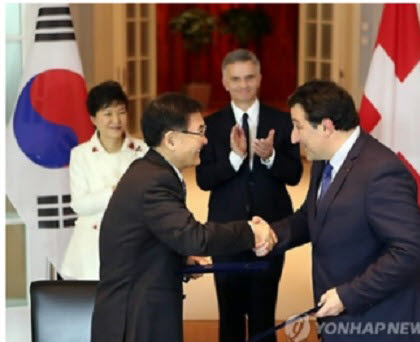 2014 Davos Forum: KAIST-EPFL Connection
The Korean-American Science and Technology News (KASTN), a biweekly global electronic newsletter carrying news and analyses in science and technology, as well as social, economic, and cultural issues related to the general interest of the Korean-American professional community, published an article on the partnership agreement made by KAIST and the Ecole Polytechnique Federale Lausanne (EPFL) during the 2014 World Economic Forum held at Davos, Switzerland, from January 22nd to 25th.
For the article, please click the link below: KASTN Issue 14-05, February 26, 2014
http://www.phy.duke.edu/~myhan/b_14-05.pdf
2014.02.04 View 10370
2014 Davos Forum: KAIST-EPFL Connection
The Korean-American Science and Technology News (KASTN), a biweekly global electronic newsletter carrying news and analyses in science and technology, as well as social, economic, and cultural issues related to the general interest of the Korean-American professional community, published an article on the partnership agreement made by KAIST and the Ecole Polytechnique Federale Lausanne (EPFL) during the 2014 World Economic Forum held at Davos, Switzerland, from January 22nd to 25th.
For the article, please click the link below: KASTN Issue 14-05, February 26, 2014
http://www.phy.duke.edu/~myhan/b_14-05.pdf
2014.02.04 View 10370 -
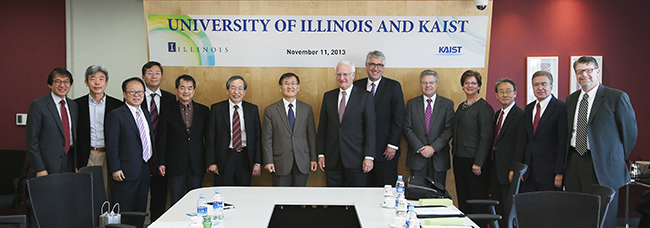 Visit by the President of the University of Illinois at Urbana-Champaign, US
A delegation from the University of Illinois at Urbana-Champaign (UIUC) in the United States visited KAIST on November 11, 2013.
The delegation consisted of senior administrators from the university, the president, vice president for research, dean of engineering college, dean of nursing college, and associate chancellor for corporate and international relations. The managing director of the State of Illinois Far East Office also joined the delegation.
They met with President Steve Kang, including vice presidents and deans of KAIST, and discussed forming a possible partnership between KAIST and UIUC.
Robert A. Easter, the president of UIUC, said, “Higher education institutions today are bearing a critical responsibility to increase the awareness, knowledge, skills, and values needed to create a sustainable future. I hope KAIST and the University of Illinois will join forces to lead innovation in higher education and to stay connected and relevant in a global marketplace.”
President Steve Kang responded, “There would be many opportunities for the two universities to collaborate and achieve global preeminence in such field as biotechnology, engineering, and convergence research.”
The University of Illinois, with three distinct campuses in Chicago, Springfield, and Urbana-Champaign, is one of the most prestigious universities in the world. The university has an annual operating budget of more than USD 5 billion, collectively enrolls more than 78,000 students, awards nearly 20,000 degrees each year, and has more than 665,000 alumni around the world.
2013.11.18 View 8972
Visit by the President of the University of Illinois at Urbana-Champaign, US
A delegation from the University of Illinois at Urbana-Champaign (UIUC) in the United States visited KAIST on November 11, 2013.
The delegation consisted of senior administrators from the university, the president, vice president for research, dean of engineering college, dean of nursing college, and associate chancellor for corporate and international relations. The managing director of the State of Illinois Far East Office also joined the delegation.
They met with President Steve Kang, including vice presidents and deans of KAIST, and discussed forming a possible partnership between KAIST and UIUC.
Robert A. Easter, the president of UIUC, said, “Higher education institutions today are bearing a critical responsibility to increase the awareness, knowledge, skills, and values needed to create a sustainable future. I hope KAIST and the University of Illinois will join forces to lead innovation in higher education and to stay connected and relevant in a global marketplace.”
President Steve Kang responded, “There would be many opportunities for the two universities to collaborate and achieve global preeminence in such field as biotechnology, engineering, and convergence research.”
The University of Illinois, with three distinct campuses in Chicago, Springfield, and Urbana-Champaign, is one of the most prestigious universities in the world. The university has an annual operating budget of more than USD 5 billion, collectively enrolls more than 78,000 students, awards nearly 20,000 degrees each year, and has more than 665,000 alumni around the world.
2013.11.18 View 8972 -
 KAIST and Saudi Aramco agreed to establish a joint CO2 research center in Korea
The Korea Advanced Institute of Science and Technology (KAIST) and Saudi Aramco, a global energy and petrochemicals enterprise, signed a memorandum of understanding (MOU) on January 6, 2013 in Dhahran, Saudi Arabia and pledged to jointly collaborate in research and development of innovative technologies and solutions to address the world"s energy challenges.
Under the MOU, the two entities agreed to establish a research center, Saudi Aramco-KAIST CO2 Research Center, near KAIST"s main campus in Daejeon, Korea. The research center, to be jointly managed by KAIST and Saudi Aramco, will foster and facilitate research collaborations in areas such as tackling carbon dioxide (CO2) emissions by removal or capture of CO2, conversing CO2 into useful products, developing efficiency improvements in energy production, sharing carbon management technologies, establishing exchange programs, and conducting joint projects.
According to Saudi Aramco, the company"s collaboration with KAIST is the first partnership established in Asia. Khalid A. Al-Falih, President and CEO of Saudi Aramco, said,
"The CO2 Research Center represents a major step in Saudi Aramco"s research and technology strategy to partner with top global institutions to help address and find sustainable solutions to the world’s energy challenge both domestically and internationally."
2013.03.19 View 12024
KAIST and Saudi Aramco agreed to establish a joint CO2 research center in Korea
The Korea Advanced Institute of Science and Technology (KAIST) and Saudi Aramco, a global energy and petrochemicals enterprise, signed a memorandum of understanding (MOU) on January 6, 2013 in Dhahran, Saudi Arabia and pledged to jointly collaborate in research and development of innovative technologies and solutions to address the world"s energy challenges.
Under the MOU, the two entities agreed to establish a research center, Saudi Aramco-KAIST CO2 Research Center, near KAIST"s main campus in Daejeon, Korea. The research center, to be jointly managed by KAIST and Saudi Aramco, will foster and facilitate research collaborations in areas such as tackling carbon dioxide (CO2) emissions by removal or capture of CO2, conversing CO2 into useful products, developing efficiency improvements in energy production, sharing carbon management technologies, establishing exchange programs, and conducting joint projects.
According to Saudi Aramco, the company"s collaboration with KAIST is the first partnership established in Asia. Khalid A. Al-Falih, President and CEO of Saudi Aramco, said,
"The CO2 Research Center represents a major step in Saudi Aramco"s research and technology strategy to partner with top global institutions to help address and find sustainable solutions to the world’s energy challenge both domestically and internationally."
2013.03.19 View 12024 -
 Korea Times on Mobile Harbor, May 29, 2011
The Korea Times mentioned KAIST’s Mobile Harbor in its recent article entitled “Korea-UAE partnership making big strides” dated May 29, 2011. While talking about the ongoing partnership efforts being made between Korea and the United Arab Emirates (UAE) in many areas of industry, economy, and education, the paper picked the mobile harbor as an example of Korea’s green growth technology being developed by KAIST. For the article, please copy and paste the link.
http://www.koreatimes.co.kr/www/news/include/print.asp?newsIdx=87873
2011.05.30 View 12748
Korea Times on Mobile Harbor, May 29, 2011
The Korea Times mentioned KAIST’s Mobile Harbor in its recent article entitled “Korea-UAE partnership making big strides” dated May 29, 2011. While talking about the ongoing partnership efforts being made between Korea and the United Arab Emirates (UAE) in many areas of industry, economy, and education, the paper picked the mobile harbor as an example of Korea’s green growth technology being developed by KAIST. For the article, please copy and paste the link.
http://www.koreatimes.co.kr/www/news/include/print.asp?newsIdx=87873
2011.05.30 View 12748 -
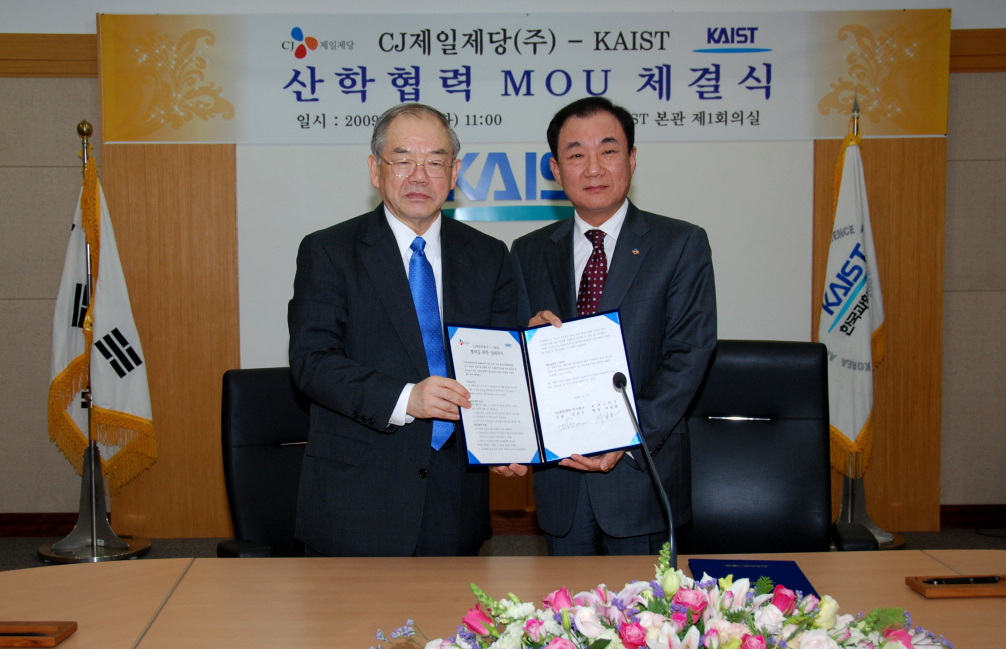 KAIST, CJ Sign MOU for Joint Research in Fundamental Technologies
KAIST and CJ Corporation, Korea"s leading foodstuff maker, have reached an agreement for an enhanced industry-academy cooperation in the biotechnology area, the university authorities said on Tuesday (Nov. 10).
KAIST President Nam-Pyo Suh signed a memorandum of understanding with Kim Jin-soo, CEO of CJ, at the KAIST campus on Tuesday (Nov. 10).
Under the agreement, KAIST and CJ will cooperate in nurturing elite research manpower and conducting joint researches in fundamental technologies. Specifically, CJ researchers will suggest research subjects linked with doctorate programs to KAIST, and once these subjects are accepted by KAIST, CJ researchers will conduct research under the guidance of KAIST professors to get doctorate degrees. All the costs including research expenses incurred during the program will be provided by CJ.
The agreement also calls for CJ to provide funding for the research subjects it selected among the ones suggested by KAIST"s biotechnology professors.
CJ CEO Jin-Soo Kim said: "Through the joint researches with KAIST which has the highest research capabilities, CJ can strengthen basic research capabilities and secure elite research manpower. We hope that the KAIST-CJ partnership will become a successful model for cooperation between industry and academia."
2009.11.11 View 15053
KAIST, CJ Sign MOU for Joint Research in Fundamental Technologies
KAIST and CJ Corporation, Korea"s leading foodstuff maker, have reached an agreement for an enhanced industry-academy cooperation in the biotechnology area, the university authorities said on Tuesday (Nov. 10).
KAIST President Nam-Pyo Suh signed a memorandum of understanding with Kim Jin-soo, CEO of CJ, at the KAIST campus on Tuesday (Nov. 10).
Under the agreement, KAIST and CJ will cooperate in nurturing elite research manpower and conducting joint researches in fundamental technologies. Specifically, CJ researchers will suggest research subjects linked with doctorate programs to KAIST, and once these subjects are accepted by KAIST, CJ researchers will conduct research under the guidance of KAIST professors to get doctorate degrees. All the costs including research expenses incurred during the program will be provided by CJ.
The agreement also calls for CJ to provide funding for the research subjects it selected among the ones suggested by KAIST"s biotechnology professors.
CJ CEO Jin-Soo Kim said: "Through the joint researches with KAIST which has the highest research capabilities, CJ can strengthen basic research capabilities and secure elite research manpower. We hope that the KAIST-CJ partnership will become a successful model for cooperation between industry and academia."
2009.11.11 View 15053